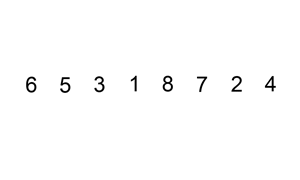Insertion sort
Insertion sort is a simple sorting algorithm that builds the final sorted array (or list) one item at a time. It is much less efficient on large lists than more advanced algorithms such as quicksort, heapsort, or merge sort. However, insertion sort provides several advantages:
- Simple implementation
- Efficient for (quite) small data sets
- Adaptive (i.e., efficient) for data sets that are already substantially sorted: the time complexity is O(n + d), where d is the number ofinversions
- More efficient in practice than most other simple quadratic (i.e., O(n2)) algorithms such as selection sort or bubble sort; the best case (nearly sorted input) is O(n)
- Stable; i.e., does not change the relative order of elements with equal keys
- In-place; i.e., only requires a constant amount O(1) of additional memory space
- Online; i.e., can sort a list as it receives it
When humans manually sort something (for example, a deck of playing cards), most use a method that is similar to insertion sort.[1]

1
2
3
4
5
6
7
8
9
10
11
12
13
14
15
16
17
18
19
20
21
22
23
24
25
26
27
28
29
30
31
32
| package com.java2novice.algos;public class MyInsertionSort { public static void main(String[] args) { int[] input = { 4, 2, 9, 6, 23, 12, 34, 0, 1 }; insertionSort(input); } private static void printNumbers(int[] input) { for (int i = 0; i < input.length; i++) { System.out.print(input[i] + ", "); } System.out.println("\n"); } public static void insertionSort(int array[]) { int n = array.length; for (int j = 1; j < n; j++) { int key = array[j]; int i = j-1; while ( (i > -1) && ( array [i] > key ) ) { array [i+1] = array [i]; i--; } array[i+1] = key; printNumbers(array); } }} |
// The values in A[i] are checked in-order, starting at the second one
for i ← 1 to i ← length(A)
{
// at the start of the iteration, A[0..i-1] are in sorted order
// this iteration will insert A[i] into that sorted order
// save A[i], the value that will be inserted into the array on this iteration
valueToInsert ← A[i]
// now mark position i as the hole; A[i]=A[holePos] is now empty
holePos ← i
// keep moving the hole down until the valueToInsert is larger than
// what's just below the hole or the hole has reached the beginning of the array
while holePos > 0 and valueToInsert < A[holePos - 1]
{ //value to insert doesn't belong where the hole currently is, so shift
A[holePos] ← A[holePos - 1] //shift the larger value up
holePos ← holePos - 1 //move the hole position down
}
// hole is in the right position, so put valueToInsert into the hole
A[holePos] ← valueToInsert
// A[0..i] are now in sorted order
}
No comments:
Post a Comment